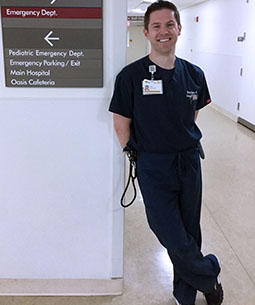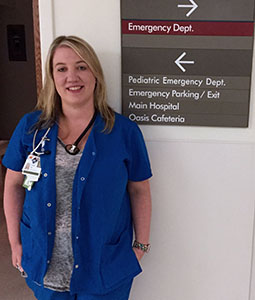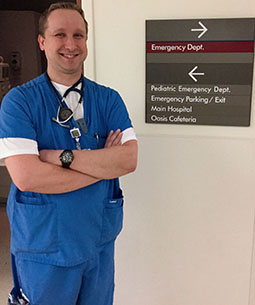Life-changing moments inspire Emergency Department physicians and nurses to give their all
July 17, 2017
NCH’s ED earns national award for excellence
NCH’s ED is one of only three EDs in the state and 22 EDs in the country to earn the prestigious 2017 Lantern Award.
For staff working in the Lantern Award-winning Emergency Department (ED) at Northwest Community Hospital (NCH), each day is filled with new challenges and non-stop treatment of 60,000 people annually who are sick, injured or experiencing life-threatening trauma. Working in a fast-paced environment can be emotionally and physically draining, but, day in and day out, the NCH ED team ensures excellent emergency care is provided to every patient who comes through the doors.
Three ED team members share some of their most impactful moments they’ve experienced in the ED, describing how their interactions with patients—and with each other—motivate them to give their best every day.
Brian Doane, M.D., Assistant Medical Director

“A 25-year-old man, whom I had seen a few months prior for connected tissue disorder, came into the ED with his mother for chest pain. The young man proved to have a tear in the big vessel coming from his heart, a potentially life-threatening problem. I remember how reactive the nurses and consultants were and how supportive his family was. The patient’s family contacted me following his discharge to inform me the young man had undergone successful surgery, performed by one of the vascular surgeons at NCH. He was doing well. What made this encounter so meaningful is both the patient and family keep in touch with me. When working in the ED, we often don’t get to form close patient relationships. It was so uplifting to have the family respond to the care we gave. It’s nice when people who have had a good experience in the ED check back later to say what you do matters in their lives.”
Jennifer E., R.N.

“A woman in her 40s came to our ED because of stress-related issues. She had just lost her husband and assumed the loss was causing her physical problems. We ran tests and actually determined she had advanced lung cancer. The patient’s two young children were with her, and she was so worried because she was the only person they had left. That day, I stayed past my shift to talk with the woman and her children. She felt so alone, unsure and just needed someone with whom she could discuss her fears. Seeing the woman and her children so afraid has impacted my career and the way in which I practice healthcare. I now take more time to be there with patients and make them feel comfortable. I make sure that I listen and make people feel like we are not just treating a problem, but treating a person. Months afterwards, the woman sent a nice card to the hospital, saying, ‘It’s nice to know someone sits to listen.’ ”
Scott P., R.N.

“A patient in his mid-50s came to us for treatment of stroke-like symptoms, including significant one-sided deficits. After determining the patient, indeed, had experienced a stroke, we administered the clot-busting drug, tPA. He was admitted to the Intensive Care Unit for close monitoring and was ultimately discharged without any permanent neurological deficits. Five months later, the patient ran into me outside of the hospital. Initially, I didn’t recognize him, but his face looked familiar. He approached me, shook my hand and even knew my name. He gave me a hug and said, ‘I just wanted to thank you for doing such a great job. You gave me clot-busting medication, and I don’t have any stroke symptoms because of that.’ He told me how he had changed his bad habits and overall lifestyle, and said he was very grateful for the experience he had in our emergency department.”